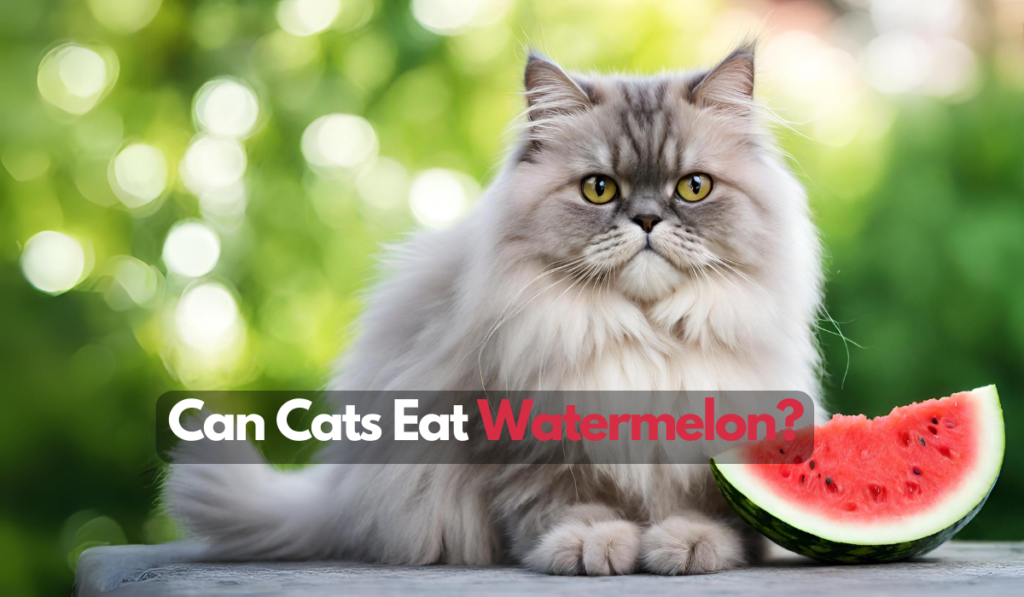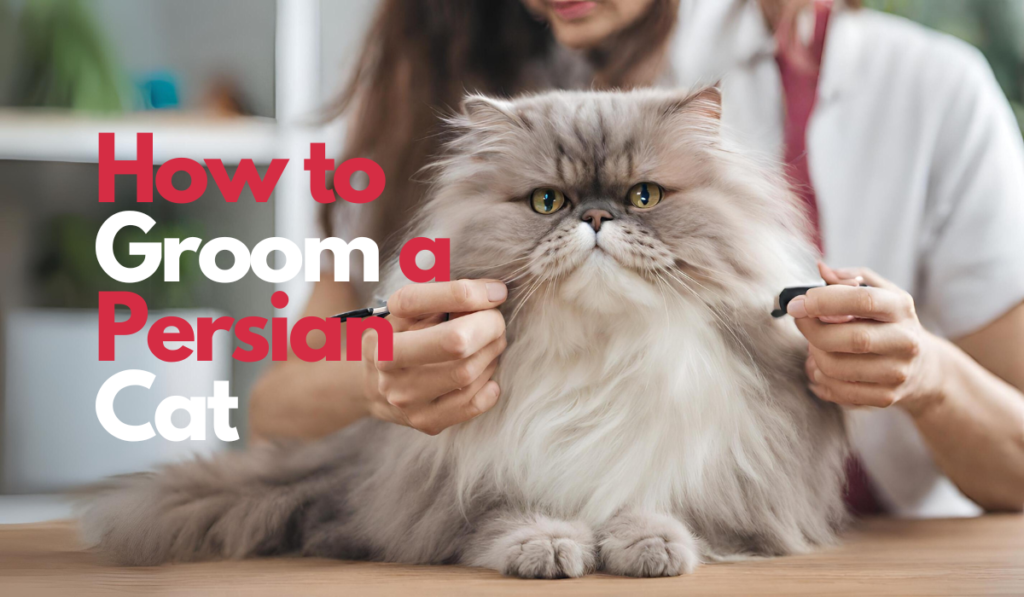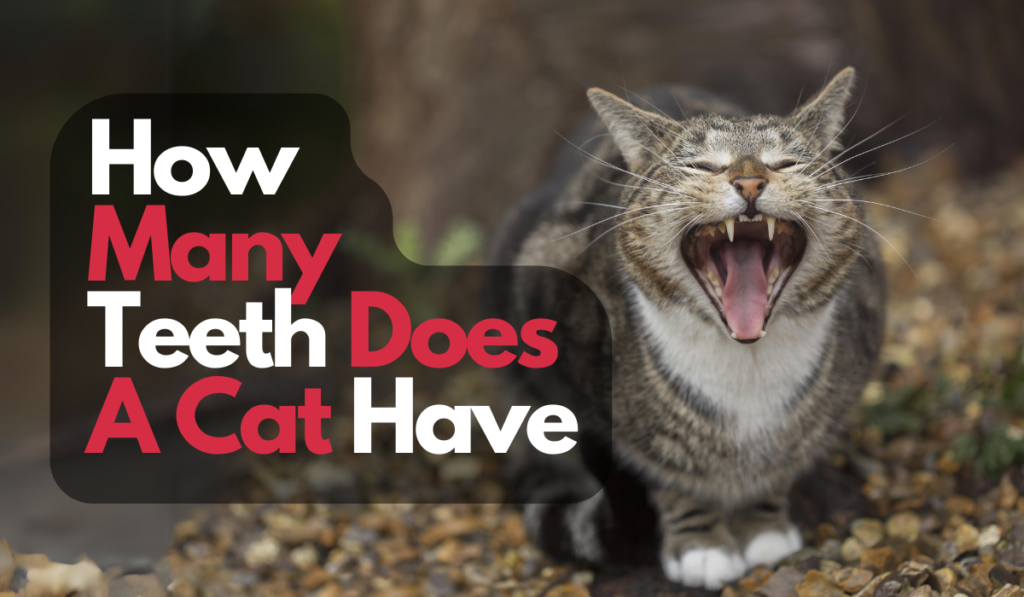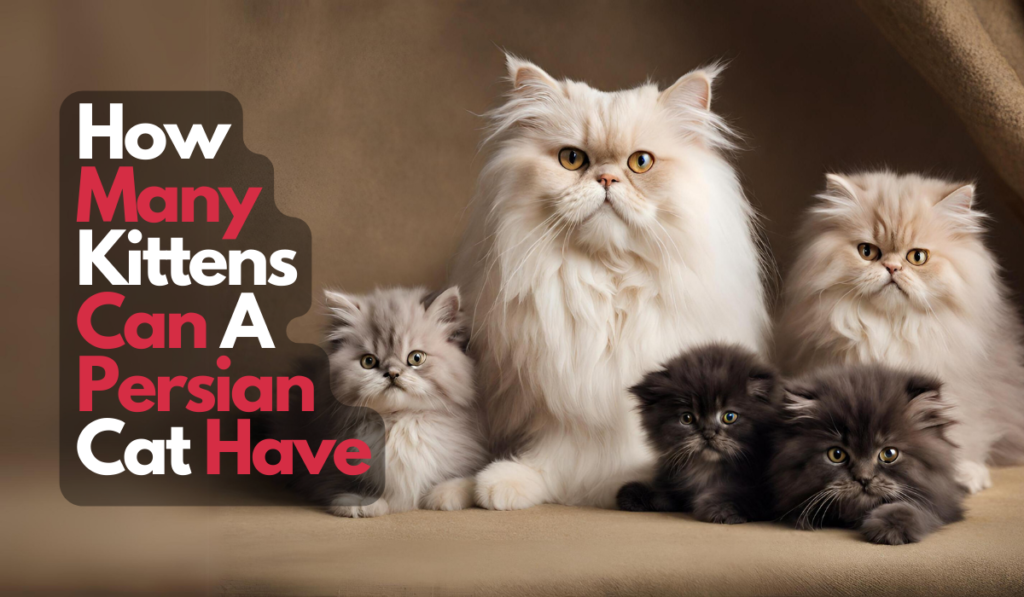Many people enjoy Watermelon, a delicious and refreshing fruit, especially in the summer. But what about our feline friends? Can cats eat Watermelon, too? Is it safe and healthy for them, or is it best to avoid giving them this juicy treat?
In this blog post, we will answer these questions and more. We will explore the benefits and risks of Watermelon for cats, how to prepare and serve it properly, and what to do if your cat has an adverse reaction to it.
We will also provide tips and alternatives for feeding your cat fruits and vegetables.
What is Watermelon?
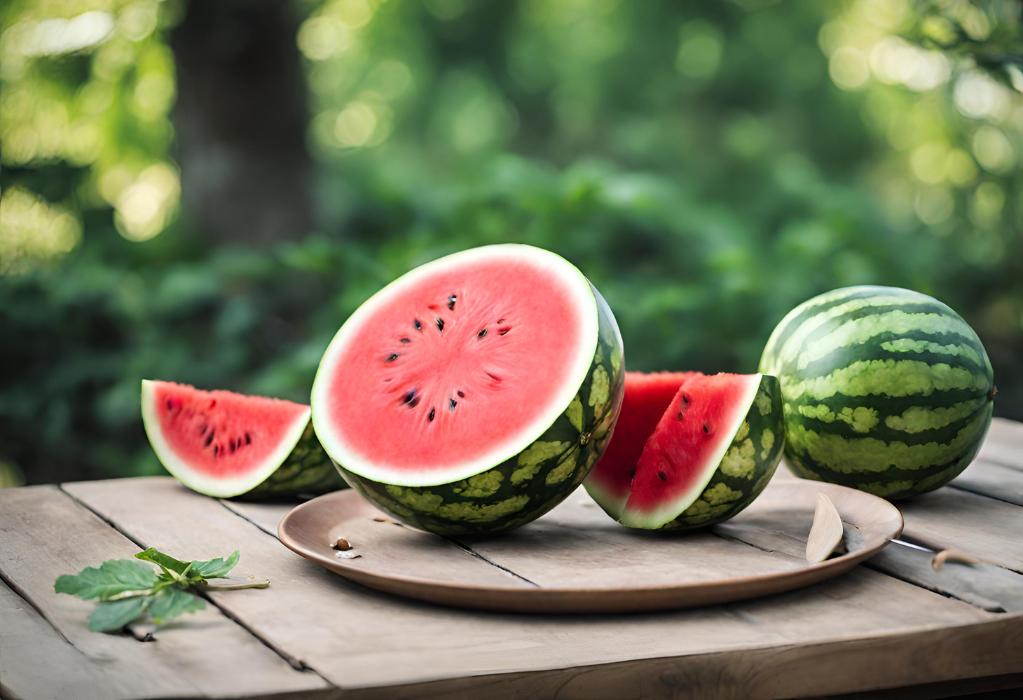
Watermelon is a type of melon that belongs to the Cucurbitaceae family, along with cucumbers, pumpkins, and squash. It originated in Africa and was cultivated by ancient Egyptians, who valued it for its high water content and sweet taste.
Watermelon has a thick green rind that protects the inner flesh, usually red or yellow and contains many black seeds. The flesh is mostly water (about 92%) and sugar (about 6%), but also contains some vitamins, minerals, antioxidants, and amino acids.
Watermelon is low in calories and fat but high in carbohydrates. A 100-gram serving of Watermelon provides about 30 calories, 0.2 grams of fat, 7.6 grams of carbohydrates, 0.6 grams of protein, and 0.4 grams of fibre.
Can Cats Eat Watermelon?

Yes, Cats can eat Watermelon without any issues or side effects. Watermelon if it is seedless and without the rind. However, the health benefits of watermelon for cats are different from those for humans. Cats are carnivores, which means they need meat as their primary source of protein and nutrients.
Watermelon does not provide enough of these essential elements for cats. It may also contain too much sugar for some cats. Therefore, watermelon should only be given to cats as an occasional snack rather than as a regular part of their diet.
Is Watermelon Good for Cats?
While Watermelon is relatively safe for healthy cats and kittens, it isn’t suitable. Cats are obligate carnivores, requiring animal protein and fat to survive and thrive. They have evolved to digest meat efficiently, but not plant matter.
Cats don’t have the enzymes or bacteria in their digestive system to break down carbohydrates or fibre from fruits and vegetables. Watermelon will pass through their system mostly undigested, providing little nutritional value.
Watermelon does contain some vitamins and minerals that cats need, such as vitamin A, vitamin C, potassium, magnesium, and lycopene. However, these nutrients are in tiny amounts in Watermelon, and cats can get them from other sources more efficiently.
Watermelon also contains much water, which can help keep your cat hydrated. However, cats should get most of their water from their diet (preferably wet food) or drinking fresh water regularly.
Is Watermelon Bad for Cats?
While seedless and rind-free watermelon can be safe for cats in moderation, it’s crucial to understand the nuances. Cats, being obligate carnivores, require meat for primary protein and nutrients. Watermelon, lacking these essentials, may offer excess sugar. Thus, it’s advisable to treat cats with watermelon occasionally, ensuring it doesn’t become a staple in their diet.
Potential Risks of Watermelon for Cats:
- Choking hazard: The seeds and rind of Watermelon can pose a choking hazard for cats if they swallow them whole or in large pieces. If stuck in the digestive tract, they can cause intestinal blockage or perforation.
- Diarrhoea: Watermelon’s high sugar and fibre content can upset your cat’s stomach and cause diarrhoea or loose stools. This can lead to dehydration and electrolyte imbalance if not treated promptly.
- Obesity: Watermelon’s high sugar and carbohydrate content can contribute to weight gain and obesity in cats if fed too frequently or in large amounts. Obesity can lead to various health issues in cats, such as diabetes, arthritis, heart disease, and liver disease.
- Dental problems: The sugar in Watermelon can promote bacterial growth and plaque formation on your cat’s teeth, leading to dental problems such as tooth decay, gum disease, and bad breath.
- Allergic reaction: Some cats may be allergic or intolerant to Watermelon or its components, such as citrulline or lycopene. This can cause symptoms such as itching, swelling, hives, vomiting, diarrhoea, or difficulty breathing. If you notice any signs of an allergic reaction in your cat after eating Watermelon, contact your vet immediately.
How to Feed Watermelon to Cats?
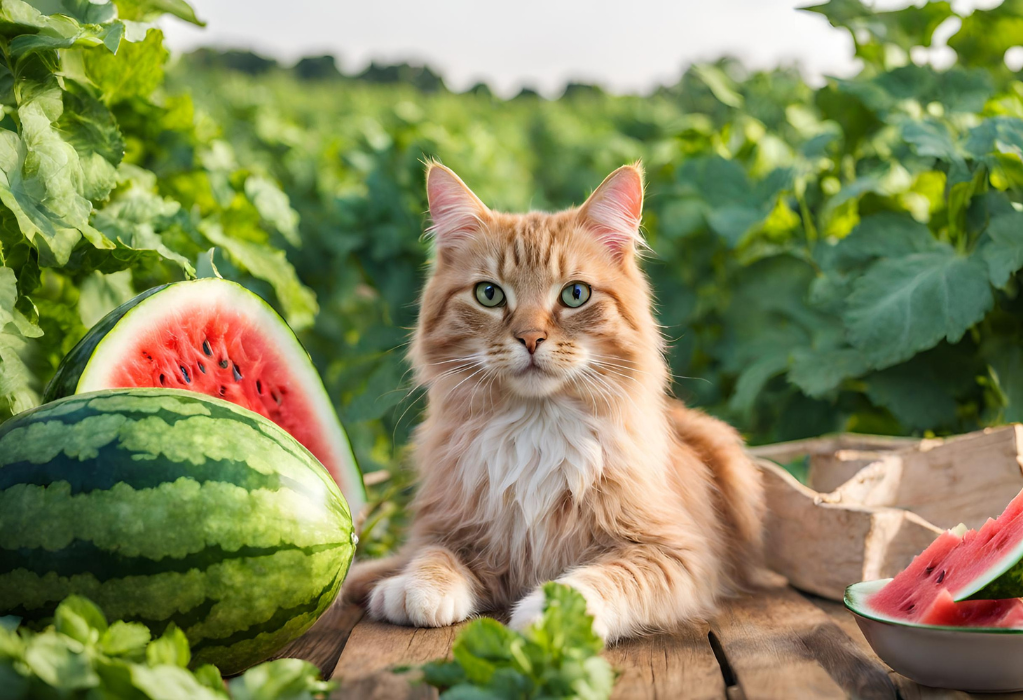
If you want to give your cat a taste of Watermelon as an occasional treat, you should follow these steps:
- Choose a ripe and fresh watermelon that is free of mould or bruises.
- Wash the Watermelon thoroughly under running water to remove any dirt or pesticides.
- Cut off a small piece of the flesh (about a teaspoon) and remove any seeds or rind.
- Mash or chop the flesh into tiny pieces your cat can easily swallow.
- Offer the Watermelon to your cat in a small bowl or plate, or hand-feed it to them gently.
- Monitor your cat’s reaction and behaviour after eating the Watermelon. If they show any signs of discomfort, distress, or allergy, stop feeding them Watermelon and consult your vet.
- Limit the amount of Watermelon you give your cat to no more than 10% of their daily calorie intake. For an average 10-pound cat, this would be about one or two teaspoons of Watermelon daily.
- Store the leftover Watermelon in an airtight container in the refrigerator for up to three days or in the freezer for up to six months.
Alternatives to Watermelon for Cats
Suppose you want to provide your cat with some variety and extra hydration in their diet. In that case, some alternatives to Watermelon are more suitable and beneficial for them. Some examples are:
- Canned or wet cat food contains about 75% water and provides your cat with all the essential nutrients they need. It also helps prevent cats’ urinary tract infections and kidney disease by diluting their urine and flushing out toxins. You can add warm water to the canned food to increase the moisture content and make it more appealing for your cat.
- Broth or soup: Made from meat, fish, or poultry, it can be a great way to hydrate your cat and provide extra protein and flavour. Make sure the broth or soup is free of any seasonings, spices, onions, garlic, or other ingredients that may be harmful to cats. You can offer the broth or soup to your cat as a drink or mix it with their dry food.
- Ice cubes Can be a fun and refreshing treat, especially in hot weather. You can freeze plain water or broth in an ice cube tray and give your cat one or two cubes to lick or play with. Be careful not to give your cat too many ice cubes at once, which can lower their body temperature and cause hypothermia.
- Cat grass: Safe and beneficial for cats to eat. It can help with digestion, hairball prevention, dental health, and stress relief. You can grow your cat grass at home or buy ready-made from pet stores or online. Offer your cat some fresh cat grass daily as a snack or supplement.
Conclusion
Watermelon is a tasty and refreshing fruit that many love, but it is not the best choice for cats. Cats can eat Watermelon safely in small amounts as an occasional treat but don’t need it as part of their diet. Watermelon has little nutritional value for cats and can cause health problems if fed too often or in large quantities.
Suppose you want to give your cat some variety and extra hydration in their diet. In that case, better alternatives to Watermelon are more suitable and beneficial. These include canned or wet cat food, broth or soup, ice cubes, and cat grass.
Always consult your vet before introducing new foods to your cat’s diet, and monitor their reaction and behaviour after eating them. If you notice any signs of discomfort, distress, or allergy in your cat after eating Watermelon or any other food, stop feeding them that food and contact your vet immediately.

